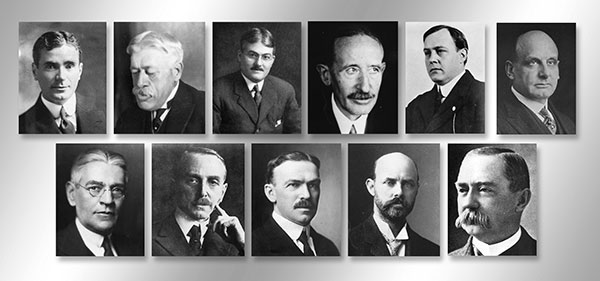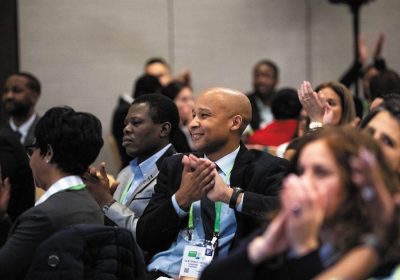
The Inspiring Evolution of AACR Members
AACR keeps pace with a rapidly growing and changing membership.

On May 7, 1907, 11 scientists and physicians met in Washington, D.C., and founded the American Association for Cancer Research (AACR). A year after its founding, the AACR welcomed its first female member, Martha Tracy, MD, DrPH, of the Women’s Medical College of Pennsylvania in Philadelphia.
Today, the AACR is the world’s first and largest professional organization dedicated to advancing cancer research and its mission to prevent and cure all cancers. Members represent the full spectrum of cancer research, including biology, translational research, cancer prevention and early detection, epidemiology, and clinical research.
The AACR boasts a diverse and international group of more than 54,000 members—the most in the history of the organization—who live and work in 131 countries and territories. Women comprise 44% of the membership, and half of the leadership positions are currently held by women.
More than 5,000 AACR members have been part of the association for more than 25 years—more than 200 of whom have been with the AACR for 50 years or longer. The AACR is proud to have had 77 Nobel laureates among its ranks.
Minorities in Cancer Research
Consistent with its ongoing evolution, the AACR has formed task forces, councils, and committees to meet the needs of its increasingly diverse membership. Among its thriving councils is the AACR Minorities in Cancer Research (MICR) Council, formed 20 years ago to meet the professional needs and advance the careers of scientists from minority groups. MICR currently has about 7,000 members working to increase the number, visibility, and recognition of minority group scientists in cancer research and the AACR.
Clayton C. Yates, PhD, the 2022-2023 chairperson of the MICR Council, says there has been real progress in growing MICR membership and putting a spotlight on minority-centered cancer research.
“When I became a member of the AACR earlier in my career, the MICR members would meet in a relatively small room, and now we take up multiple ballrooms at events,” said Dr. Yates, the director of Translational Health Disparities and Global Health Equity Research at the Johns Hopkins Kimmel Cancer Center in Baltimore. “The number of minority faculty members at academic institutions has increased, and disparities research is now at the forefront of science. I started my career 15 years ago when there was no acknowledgment of cancer health disparities. That has changed, and so now we have acknowledgment, an increase in funding for health disparities, and some progress.”
Women in Cancer Research
Another active and growing group is the AACR Women in Cancer Research (WICR) Council, committed to recognizing women’s scientific achievements and fostering their career development and advancement in cancer research. “Our goal is not just to increase the number of women members within the AACR, but it is also to elevate their participation and promote their recognition,” said 2022-2023 chairperson Sheila Singh, MD, PhD, chief of neurosurgery and director of the Centre for Discovery in Cancer Research at McMaster University in Hamilton, Ontario.
Female scientists and clinicians are well represented in graduate and medical schools and among early-career faculty, she said, but women’s representation among assistant, associate, and full professor faculty appointees lags behind. “Within the WICR, we are providing not just advice, but also a community of support, mentorship, and visibility, and addressing the issues of why younger women trainees are not rising to the top positions in their fields,” Dr. Singh said.
Early-Career Scientists
The AACR Associate Member Council (AMC) supports early-career scientists—graduate students, medical students and residents, and clinical and postdoctoral fellows. “When you are at the early stage of your career, it’s very hard sometimes to navigate your career path and make sure you are moving in the right direction,” said Francesco Caiazza, PhD, a senior scientist at CytomX Therapeutics in San Francisco and the 2022-2023 AMC chairperson. The council advocates for the needs of associate members and plans programming designed to help them advance their careers. “It’s very important to have that kind of support in terms of planning your career and making informed decisions,” Dr. Caiazza said.
While the AMC is active throughout the year, the group’s efforts are on full display at the AACR Annual Meeting each spring. The AMC helps present the meeting’s professional development sessions, covering topics such as grant writing and mentorship. Beyond the seminars, the AMC allows associate members to network and foster connections with experienced researchers.
High School and Undergraduate Students
Another important group is the AACR Science Education and Career Advancement Committee, which addresses the needs of high school and undergraduate members and develops programs for students and teachers. For example, during every AACR Annual Meeting, local high school students and their teachers are invited for a full day of presentations from cancer researchers and given a chance to meet and interact with cancer survivors and peers with similar interests.
Another program in development is a summer internship for high school students that is likely to begin in 2024, said Brian M. Rivers, PhD, MPH, 2022-2023 chair of the Science Education and Career Advancement Committee and director of the Cancer Health Equity Institute at the Morehouse School of Medicine in Atlanta.
“We want to get students into innovative STEM programs by high school to ensure an adequate resourced pathway for scientifically minded students who will elect to pursue science majors and then careers,” said Dr. Rivers.
Kathleen W. Scotto, PhD, the past chair and a current member of the Science Education and Career Advancement Committee, joined the AACR when she was a graduate student. “I had a very supportive mentor, which was not that common [for women] in the late 1970s,” said Dr. Scotto, who is now the vice chancellor for research and training, vice dean of the School of Graduate Studies, and a cancer researcher at Rutgers University in New Jersey. “My adviser took me to my first AACR Annual Meeting, and it was transformative. The opportunity to meet with trailblazers in the field was and still is extraordinary, and I have been involved with the AACR ever since.”
Margaret Foti, PhD, MD (hc), the chief executive officer of the AACR, emphasized the importance of education and training in the AACR’s mission. “Fifty-two percent of our members are associate members, and 4 percent are high school students or undergraduates, meaning much of the membership is young,” said Dr. Foti. “We have to maintain our educational activities in support of this large cohort of our membership, and with such a large proportion of young members, the AACR will play a vital role in the future of cancer research.”



